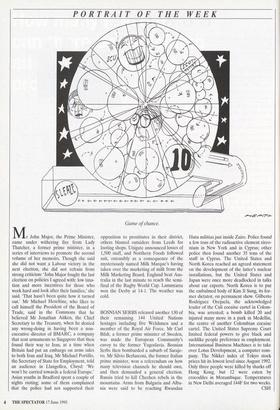PORTRAIT OF THE WEEK
Game of chance.
Mr John Major, the Prime Minister, came under withering fire from Lady Thatcher, a former prime minister, in a series of interviews to promote the second volume of her memoirs. Though she said she did not want a Labour victory in the next election, she did not refrain from strong criticism: 'John Major fought the last election on policies I agreed with: low taxa- tion and more incentives for those who work hard and look after their families,' she said. 'That hasn't been quite how it turned out.' Mr Michael Heseltine, who likes to call himself the President of the Board of Trade, said in the Commons that he believed Mr Jonathan Aitken, the Chief Secretary to the Treasury, when he denied any wrong-doing in having been a non- executive director of BMARC, a company that sent armaments to Singapore that then found their way to Iran, at a time when Britain had put an embargo on arms sales to both Iran and Iraq. Mr Michael Portillo, the Secretary of State for Employment, told an audience in Llangollen, Clwyd: 'We won't be carried towards a federal Europe.' Asian youths in Bradford spent a couple of nights rioting; some of them complained that the police had not supported their
opposition to prostitutes in their district, others blamed outsiders from Leeds for looting shops. Unigate announced losses of 1,500 staff, and Northern Foods followed suit, ostensibly as a consequence of the mysteriously named Milk Marque's having taken over the marketing of milk from the Milk Marketing Board. England beat Aus- tralia in the last minute to reach the semi- final of the Rugby World Cup. Lammtarra won the Derby at 14-1. The weather was cold.
BOSNIAN SERBS released another 130 of their remaining 144 United Nations hostages including five Welshmen and a member of the Royal Air Force. Mr Carl Bildt, a former prime minister of Sweden, was made the European Community's envoy to the former Yugoslavia. Bosnian Serbs then bombarded a suburb of Saraje- vo. Mr Silvio Berlusconi, the former Italian prime minister, won a referendum on how many television channels he should own, and then demanded a general election. Russia tried to kill Chechen rebels in the mountains. Arms from Bulgaria and Alba- nia were said to be reaching Rwandan Hutu militias just inside Zaire. Police found a few tons of the radioactive element zirco- nium in New York and in Cyprus; other police then found another 35 tons of the stuff in Cyprus. The United States and North Korea reached an agreed statement on the development of the latter's nuclear installations, but the United States and Japan were once more deadlocked in talks about car exports. North Korea is to put the embalmed body of Kim Il Sung, its for- mer dictator, on permanent show. Gilberto Rodriguez Orejuela, the acknowledged leader of the Cali cocaine cartel in Colom- bia, was arrested; a bomb killed 20 and injured many more in a park in Medellin, the centre of another Colombian cocaine cartel. The United States Supreme Court limited federal powers to give black and suchlike people preference in employment. International Business Machines is to take over Lotus Development, a computer com- pany. The Nikkei index of Tokyo stock prices hit its lowest level since August 1992. Only three people were killed by sharks off Hong Kong, but 12 were eaten by crocodiles in Mozambique. Temperatures in New Delhi averaged 144F for two weeks.
CSH


































































 Previous page
Previous page